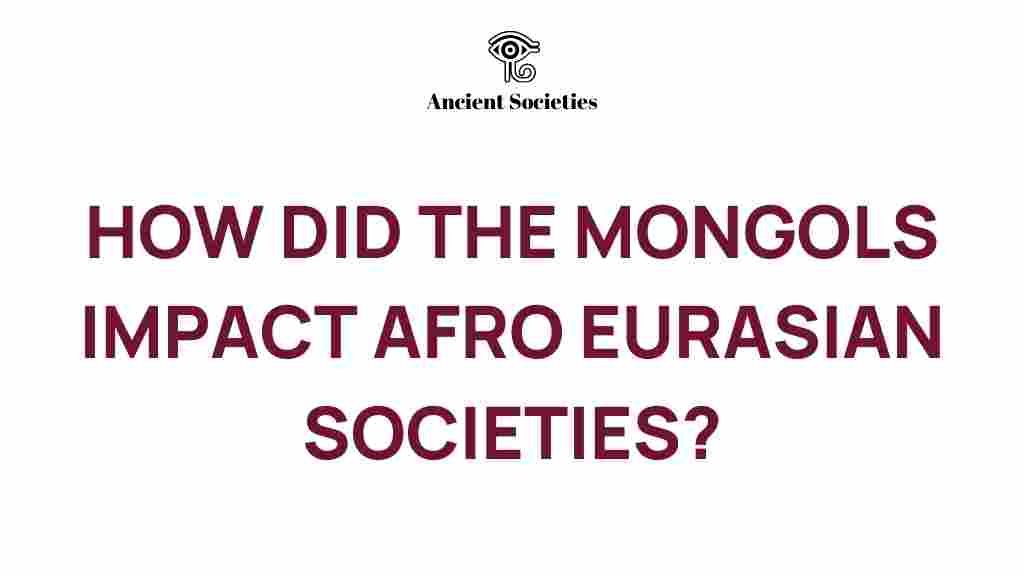Mongol Influence: Unraveling Their Impact on Afro-Eurasian Societies
The Mongol Empire, which thrived in the 13th and 14th centuries, was one of the largest contiguous empires in history. Its influence on Afro-Eurasian societies is profound and multifaceted, shaping cultural exchanges, trade routes, and societal changes that resonate even in contemporary contexts. This article delves into the Mongol influence, exploring its historical impact, the dynamics of globalization, and the connections forged along the famed Silk Road.
The Rise of the Mongol Empire
The Mongol Empire was founded by Genghis Khan in 1206 and expanded rapidly across Asia and into Europe. This expansion was not merely military; it facilitated significant cultural and economic exchanges. The Mongols unified vast territories, breaking down barriers and fostering connections among disparate cultures.
- Military Innovations: The Mongols were renowned for their military prowess, utilizing innovative tactics that allowed them to conquer vast lands.
- Administrative Skills: They established an efficient administration that allowed for effective governance over diverse regions.
- Cultural Tolerance: The Mongols practiced religious tolerance, which allowed various beliefs to flourish under their rule.
The Mongol Influence on Trade Routes
The Mongols revitalized trade routes, particularly the Silk Road, which connected the East and West. This network was crucial for the exchange of goods, ideas, and cultures. The Mongol influence on trade routes can be seen in several key areas:
- Increased Safety: The Pax Mongolica, or Mongolian Peace, ensured safety for traders, leading to a boom in trade activities.
- Standardization: The Mongols implemented standardized measures for trade, facilitating smoother transactions across vast distances.
- Infrastructure Development: They improved infrastructure, building roads and waystations that enhanced connectivity.
As a result, products such as silk, spices, and precious metals flowed freely between continents, creating a vibrant marketplace that benefited many societies.
Cultural Exchange and Societal Change
The Mongol influence was not limited to trade; it also fostered significant cultural exchanges among Afro-Eurasian societies. This cultural diffusion had lasting effects on art, science, and technology. Key aspects include:
- Art and Architecture: The blending of styles led to unique artistic expressions, as seen in Persian and Chinese artworks influenced by Mongolian motifs.
- Scientific Knowledge: The Mongols facilitated the transfer of knowledge, including advancements in astronomy and medicine, through their vast empire.
- Language and Literature: The mingling of cultures resulted in the exchange of languages and literary traditions, enriching the cultural tapestry of the regions.
This cultural exchange is a testament to the Mongol influence on societal change, demonstrating how interconnectedness can lead to greater understanding and innovation.
Historical Impact of the Mongol Empire
The historical impact of the Mongol Empire extends beyond its immediate conquests. The empire served as a catalyst for globalization, impacting economies and societies across Afro-Eurasia. Some notable historical consequences include:
- Economic Integration: The Mongols linked disparate economies, creating a more integrated market system that spurred economic growth.
- Spread of Religions: The Mongol influence facilitated the spread of religions such as Islam and Buddhism, leading to significant changes in belief systems across regions.
- Demographic Shifts: The conquests resulted in population movements, with people migrating for trade, safety, or new opportunities.
Globalization and the Legacy of the Mongols
The Mongol influence is a crucial chapter in the story of globalization. By connecting various cultures and economies, the Mongols laid the groundwork for the modern world. Their legacy includes:
- Global Trade Networks: The establishment of trade networks continues to influence economic relationships today.
- Intercultural Dialogue: The interactions initiated by the Mongols fostered dialogues that still resonate in contemporary multicultural societies.
- Historical Lessons: The Mongol Empire’s rise and fall offer insights into the dynamics of power, trade, and cultural exchange that are relevant to modern global politics.
Step-by-Step: Understanding the Mongol Influence
To fully appreciate the Mongol influence on Afro-Eurasian societies, it is essential to consider a step-by-step understanding of their contributions:
- Study the Empire’s Formation: Explore how Genghis Khan united the Mongol tribes and the strategies employed in their conquests.
- Examine Trade Routes: Analyze how the Mongol Empire enhanced trade routes, particularly the Silk Road, and its implications for global trade.
- Investigate Cultural Exchanges: Look into the various cultural exchanges that took place, including art, science, and religion.
- Assess Historical Impact: Evaluate the long-term effects of the Mongol Empire on economies, societies, and cultures across Afro-Eurasia.
- Reflect on Globalization: Consider how the Mongol influence has shaped modern globalization and intercultural interactions.
Troubleshooting Tips: Understanding Common Misconceptions
While studying the Mongol influence, one may encounter several misconceptions. Here are some troubleshooting tips to clarify these misunderstandings:
- Myth: The Mongols Were Brutal Conquerors: While the Mongols used violence in their conquests, they also promoted peace and trade within their empire.
- Myth: The Mongol Empire Was Homogeneous: In reality, the empire was incredibly diverse, with numerous cultures coexisting and influencing one another.
- Myth: The Mongols Only Impacted Asia: Their influence extended into Europe and the Middle East, affecting global history significantly.
Conclusion
The Mongol influence on Afro-Eurasian societies is a compelling narrative of conquest, cultural exchange, and economic integration. By understanding their historical impact, we gain valuable insights into how interconnected our world has been since the 13th century. The legacy of the Mongols continues to resonate in our globalized society, reminding us of the importance of trade routes, cultural exchanges, and the complex tapestry of human history.
For further exploration of the Mongol influence and its lasting effects on globalization, you may find this resource helpful. Additionally, if you’re interested in related topics, check out our article on the Silk Road’s historical significance.
This article is in the category History and created by AncientSocieties Team
